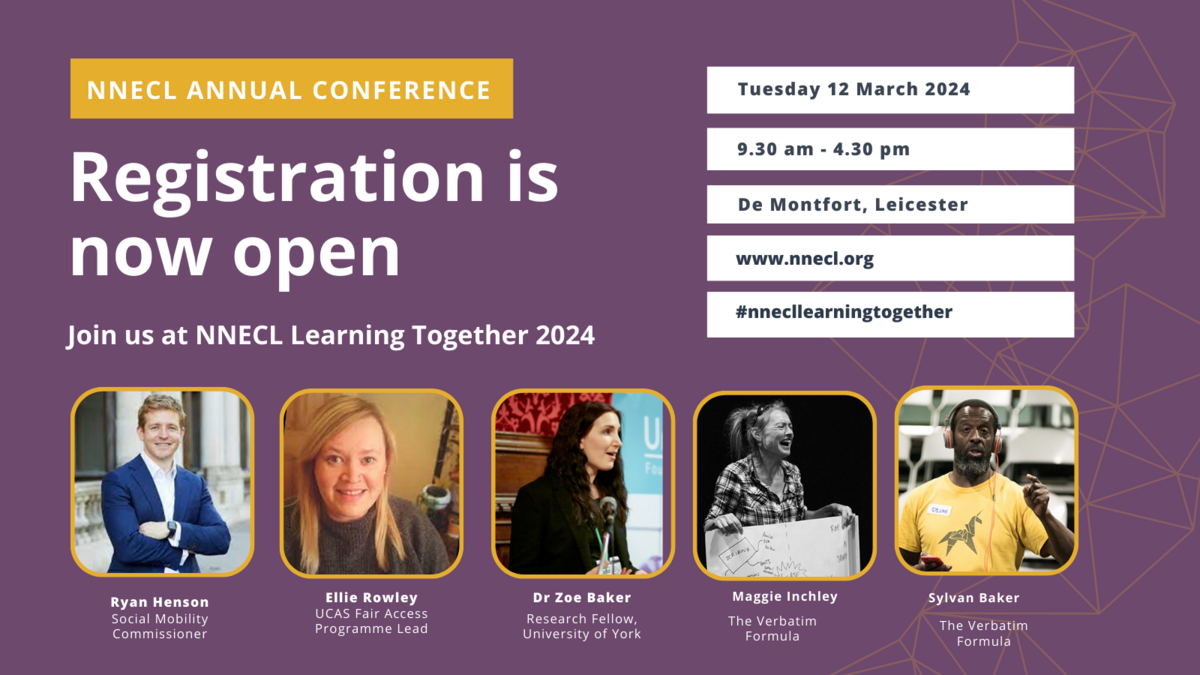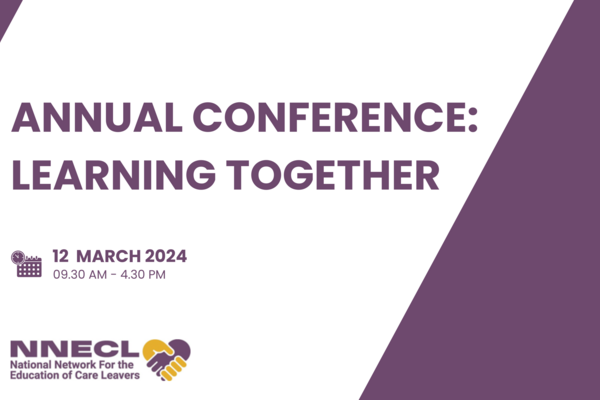
We are delighted to open our Annual NNECL Conference for booking. We do hope you will be joining us on Tuesday 12 March 2024 09.30-16.30 at De Montfort University, Leicester. Attendees at this years conference will leave with greater awareness, knowledge, and more practical tools to support the educational success of care experienced learners at their institutions.
We have worked carefully to secure fantastic key note speakers and workshop sessions for us all to learn from and enjoy, including our postponed Research Symposium element included within the workshops.
Our Keynote speakers are:
- Ryan Henson - Social Mobility Commissioner and Chief Executive Officer at the Coalition for Global Prosperity
- Ellie Rowley - UCAS Fair Access Programme Lead
- The Verbatim Formula - Maggie Inchley & Sylvan Baker, Queen Mary University, London
- Dr Zoe Baker - Research Fellow, Department of Education, University of York
During the booking process you will be invited to select one workshop option for each session, you can find details of the workshops below:
And finally, we can accept payment by BAC's or card, please select the relevant ticket option when booking on. You can find all of the tickets at the bottom of this page.
Workshop Sessions
Workshop 1:
| Ira Hakim Unite Foundation | Building social connections amongst care experienced and estranged students; institutionally, regionally, and nationally | This workshop will provide attendees with greater awareness, knowledge, and practical tools to support the growth of care experienced and estranged communities at their institutions. There will be a particular focus on building social connections with, and between, students with emphasis on increasing the sense of belonging, a key factor for student success. |
| Chrissy Farley & Hannah Bello Open University | Time to think: How 1-1 coaching/mentoring can ignite the potential within | The Personal Learning Advice service is a funded 4-year pilot project, offering 1-1 coaching and bespoke group workshops to students from cohorts where the widest institutional awarding gaps exist. This includes care-experienced learners. In this facilitated workshop, OU invite delegates to become the coachee! Chrissie Farley will lead a short sequence of silent coaching activities providing space to reflect and really think about your core values, your priorities, and your personal and professional goals. |
| Louise Harrison & Tahera Mayat Go Higher & NERAP | Collaborating to Support Care-Experienced Students | Go Higher West Yorkshire (GHWY) and North East Raising Aspiration Partnership (NERAP) are separate partnerships working across West Yorkshire and the North East of England respectively. They work collaboratively with 13 (GHWY) and 5 (NERAP) Higher Education (HE) providers in their regions. Their work aims to support informed choices and raising aspirations towards HE, including supporting care-experienced students. Both partnerships have their own collaborative Care Leaver Covenant and a common definition for care-experienced which all HE providers within their partnership agreed to adopt. The Care Leaver Covenant outlines the provision of support for students at both pre-entry and the post-entry level and includes areas such as finance, wellbeing and employment. GHWY also have a flagship 'Care to Go Higher Programme' sharing of examples and evaluation, including how evaluation can support continuous improvement in practice. This includes CPD for foster carers, children’s home staff and personal advisers and e-learning for student facing staff in FE and HE. As a diverse group of HE providers, GHWY work together to share learning and evaluation to challenge their assumptions and workshop issues to best support care-experienced students. NERAP will outline their regional, collaborative approach to developing their Regional Care Leaver Covenant core offer and expand on the 'Choices Together Progressive Programme' which forms part of the pre-entry support package for students. They will also share details of their longitudinal evaluation framework which supports deepening their understanding of how the regional core offer is additive to the recruitment and retention of care-experienced students as well as driving change and improvements. |
| Research session 1 a) Ceryn Evans Swansea University & b) Fionna McLauchlan King’s College London | a) From students to graduates: The role of learning identities, social capital and supportive relationships in care experienced students' experiences and success in higher education. b) How do virtual schools support access and transition to higher education? | a) This presentation discusses findings from a project which aimed to understand the factors which support care experienced students’ engagement and success in higher education. It illuminates the role of learning identities, social capital and supportive relationships in students’ entry to university, success in it, and transitions from students to graduates. b) This study explores the role of virtual schools in supporting access and transition to higher education for care experienced young people. Semi-structured interviews were carried out with care experienced undergraduate students aged 18-25 studying across the UK and with staff working across 4 virtual schools based in England. |
Workshop 2:
| Inner Circle Trust & Patricia Ambrose | Empowering young people in care to navigate their own futures | The gap in educational attainment for people in local authority care compared to the general population is a problem because of its correlation with poor outcomes for this group, with care leavers being overrepresented in prison populations, NEET statistics, homelessness, and reduced life expectancy. Amy is a care leaver and PhD student who will discuss her role as a Trustee in a newly founded charity called Inner Circle Educational Trust (ICET), that works collaboratively with Camden Virtual School (CVS) to pilot a project bridging the gap in educational attainment amongst this group, thereby repairing the disparity in the equality of opportunity for children and young people cared for by their local authority. ICET and CVS have collaborated on a new initiative focusing on young peoples’ need for consistency of support, through the employment of an Educational Navigator who will work with approximately 30 young people (from year 9 onwards) to support them in accessing higher education. The project commenced with the first cohort of 15 young people in September 2023. Researchers from Birmingham University & Patricia Ambrose (for NNECL) will be continuously evaluating the project to see if it achieves its intended outcomes. The aim for this presentation is to explain the project, and network ideas on ways that it could improve, and explore similar initiatives in other authorities. |
| Louise Whittaker Arts University Bournemouth | Mapping support for care experienced students across the student life cycle | In this workshop, Arts University Bournemouth will share their approach to enhancing and evaluating its strategic activity supporting care experienced students throughout their studies and into employment. The process of development for their theory of change and evaluation plan will be shared and discussed as an example of effective practice. |
| Nikki Anghileri & Katharina Stegmann St Mary’s University, Twickenham | Mind the gaps! Working with partner universities, a mental health provider and student collaborators to co-create and deliver a well-being initiative for students studying with little or no family support. | In 22/23, St Mary’s University was awarded funding through the OfS ‘Mental Health Funding Competition’ to deliver a collaborative cross-university mental health and well-being initiative for students studying with little or no family support, including care leavers, care experienced and estranged students. Through this project they co-designed and co-delivered, both face to face and online, a psychoeducation programme to support students to Identify, Develop, Reflect and Refine the skills they need to support their wellbeing throughout their first year at University. Rather than discussing the findings of this project, this workshop will focus on the process of working with a range of different collaborative partners and will outline the challenges and triumphs, the bumps and the glides along the way. Working with partners in 3 very different universities, and a mental health NHS trust, with their own cultures, priorities, systems and processes, was joyous, and yet at times a challenging and frustrating, process. |
| Research Session 2 a) Katie Ellis University of Sheffield b) Carrie Harrop Loughborough University | a) Resilience, higher education and widening participation b) Looking beyond the scope of financial support for care leavers in higher education | a) In a climate of widening participation in which universities encourage inclusion and student diversity, this research revealed how journeys to higher education for students with a care background were often marred by instability, stigma and poor institutional support. This session will critique current understandings of ‘resilience’ to conclude that greater attention should be paid to structural and systemic barriers to improve the outcomes of marginalised students. b) When we think about the barriers to higher education, we know that having appropriate financial support is key. However, the scope of this need goes beyond ‘having enough money’ and it is important to explore the ‘why’ of the need. This presentation will introduce the concept of ‘family privilege’ as a lens to provide reflexive insight when implementing innovation and change to better understand the barriers in place and increase participation. |




